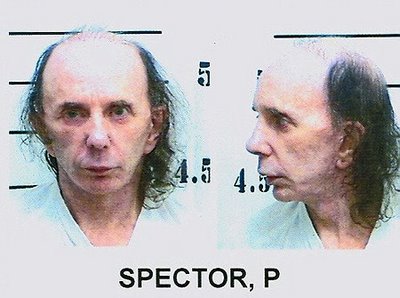
Harvey Phillip Spector (The Bronx, New York, December 26, 1939 – Los Angeles, California, January 16, 2021) was an American record producer, musician, and songwriter who is best known for his innovative recording practices and entrepreneurship in the 1960s, followed decades later by his two trials and conviction for murder in the 2000s. Spector developed the Wall of Sound, a production style that he described as a Wagnerian approach to rock and roll. He is regarded as one of the most influential figures in pop music history and one of the most successful producers of the 1960s.
Born in the Bronx, Spector moved to Los Angeles as a teenager and began his career in 1958 as a founding member of the Teddy Bears, for whom he penned "To Know Him Is to Love Him", a U.S. number-one hit. In 1960, after working as an apprentice to Leiber and Stoller, Spector co-founded Philles Records, and at the age of 21 became the youngest ever U.S. label owner to that point. Dubbed the "First Tycoon of Teen", Spector became considered the first auteur of the music industry for the unprecedented control he had over every phase of the recording process. He produced acts such as the Ronettes, the Crystals, and Ike & Tina Turner, and typically collaborated with arranger Jack Nitzsche and engineer Larry Levine. The musicians from his de facto house band, later known as "the Wrecking Crew", rose to industry fame through his hit records.
In the early 1970s, Spector produced the Beatles' Let It Be and several solo records by John Lennon and George Harrison. By the mid-1970s, Spector had produced eighteen U.S. Top 10 singles for various artists. His chart-toppers included the Righteous Brothers' "You've Lost That Lovin' Feelin'", the Beatles' "The Long and Winding Road", and Harrison's "My Sweet Lord". Following one-off productions for Leonard Cohen (Death of a Ladies' Man), Dion DiMucci (Born to Be with You), and the Ramones (End of the Century), Spector remained largely inactive amid a lifestyle of seclusion, drug use, and increasingly erratic behavior.
Spector helped establish the role of the studio as an instrument, the integration of pop art aesthetics into music (art pop), and the genres of art rock and dream pop. His honors include the 1973 Grammy Award for Album of the Year for co-producing Harrison's Concert for Bangladesh, a 1989 induction into the Rock and Roll Hall of Fame, and a 1997 induction into the Songwriters Hall of Fame. In 2004, Spector was ranked number 63 on Rolling Stone's list of the greatest artists in history. In 2009, after spending three decades in semi-retirement, he was convicted for the 2003 murder of the actress Lana Clarkson and sentenced to 19 years to life in prison. He died in prison in 2021.


.jpg)



